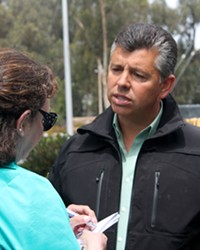With just a single cannabis business permitted and only six given temporary state licenses to operate aboveboard as of June 1, industry members and advocates blasted San Luis Obispo County at a Board of Supervisors meeting for having a "broken" permitting process that feels like a "war" between applicants and county staff.

- File Photo By Jayson Mellom
- BOTTLENECK Cannabis industry members applying for permits with SLO County complained of "unprecedented" scrutiny from officials at a Board of Supervisors hearing June 19.
County planning staff delivered a quarterly update on cannabis to the supervisors on June 19, describing a backlog of cannabis applications that's growing quickly.
"We are receiving complaints about the time it is taking to process applications, schedule meetings, and respond to inquires," a staff report read. "The department may consider assigning more staff to cannabis cases."
The county's received 34 cannabis land-use permit applications thus far and is expecting another 20 within the next month. One permit has been issued—for delivery service West Coast Organix—while the others are on "information hold" because staff asked those applicants to provide additional information about their projects.
Several cannabis growers, entrepreneurs, and their representatives expressed frustrations about the county's process during public comment, saying applicants are receiving "unprecedented" scrutiny by officials on their applications.
Jamie Jones and Lisa Bugrova, of Kirk Consulting, a North County-based land-use firm, said the county is asking for onerous studies and putting up other roadblocks that are inconsistent with what's asked of other industries.
"For cannabis, every project has received a request for a full biological resources analysis—with no valid reasoning provided," Bugrova said. "This level of scrutiny is unprecedented and is solely based on the fact that the property owner is now proposing to grow cannabis. ... There is a process that's broken here."
"We're on the front line," Jones added. "Sometimes it feels like a war. ... There's not a lot of trust coming from our operators in the county process. It's the honest truth. I hate to say that because we've worked with county staff for years, but we've never had this sort of the reception to our applicants. They are guilty before they've even submitted an application."
Cannabis growers also complained about the substance of the county's ordinance. For instance, the ordinance requires property zoned "rural lands" to be at least 50 acres to be eligible to cultivate cannabis. Kirk Azevedo, a Cambria physician pursuing medical cannabis research, said he moved his cultivation onto a rural lands property that's 25 acres. Now, under the ordinance adopted in November, it won't be eligible for a permit.
"It's difficult to find land that's 50 acres," Azevedo said. "I think it's an undue hardship for those of us who have invested in this and thought we were doing everything right by registering to just be shot down by some of these regulations."
Roughly 160 cultivators who registered with the county in 2016 and 2017 are allowed to apply for land-use permits. On Jan. 1, 2019, the state will require operators to obtain an annual license.
County supervisors made a few tweaks to the regulations that were recommended by planning staff, including allowing applicants to apply for more than one cannabis operation on their site, and setting an application deadline of Sept. 1 for cannabis projects hoping to receive approvals and state licenses by 2019.
Third District Supervisor Adam Hill voiced his own frustration with the county's regulatory framework for the new industry.
"It seems like we've given everything we possibly can for black market people to continue and everything we can to punish people who are trying to legitimately be regulated," Hill said. "We will kill a legal industry that the voters wanted to legalize." Δ



Comments (2)
Showing 1-2 of 2